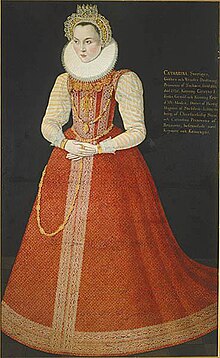Talk:Catherine of Saxe-Lauenburg
| This article is rated Start-class on Wikipedia's content assessment scale. It is of interest to the following WikiProjects: | ||||||||||||||||||||||||||||||||||||||
| ||||||||||||||||||||||||||||||||||||||
Image
[edit]The image newly inserted to the article is, I believe, not of queen Catherine. As far as I know, they were no painting made of Catherine. The painting in the article now have ben guessed to be of Princess Sophia of Sweden, according to Herman Lindqvist. If you have knowledge of fashion, you can see that the clothes are not from the 1530s, but rather from the period c. 1560-90. The colar of the dress were unknown in the 1530s. --85.226.235.231 (talk) 13:04, 6 July 2008 (UTC)
- Remowed the image. --85.226.45.179 (talk) 15:55, 17 October 2008 (UTC)

This is the picture. --85.226.45.179 (talk) 16:02, 17 October 2008 (UTC)
Dears, in it.wiki we have restored the image. By zooming the dark area beside the left shoulder you can read the original description of the painter. It starts with "CATHARINA Sverige ....... GUSTAV I.....". Still possible that painting may have completed after Catharina's death, introducing elements not pertinent to Catarina live time. --Ysogo (talk) 21:15, 8 January 2009 (UTC)
- Yes, I understand. But such descriptions are worthless. They were often added many years later, when there was a need of a portrait of this or that person, and any painting was used and had a text added to it. There is, for example, an exact same situation in the alleged painting of Queen Karin Månsdotter. Catherine was a queen, and there was a need of a painting of her, so one simply added the text to a painting from that period. This was common. Such clothes did not excist when Catherine was alive. Anyway: it would be nice with an image, but sadly, one have to accept that there is none. It is a good painting, however, and it should be here on wiki! But for the right person, of course: It is believed to be of Princess Sofia, and it is very nice to have a picture of her! --85.226.44.74 (talk) 23:52, 16 January 2009 (UTC)
- In books about the queens of Sweden, it is in fact pointed out, that there is no portrait of her, and that it is not known what she looked like. If this is disputed here, hovewer, then a simple solution would be to simply state in the text of the image, that the painting is disputed to be of either person. --85.226.44.74 (talk) 14:24, 17 January 2009 (UTC)
The print by Virgil Solis may be considered to be an image of Catherine and her sister, instead of Margareta Eriksdotter and Catherine's sister. http://www.britishmuseum.org/research/collection_online/collection_object_details.aspx?objectId=1488694&partId=1&searchText=virgil+solis+sweden&images=true&page=1 The Gustav Triumphs copies of watercolors may literally show Catherine including her fall on the dance floor with her the King of Denmark http://commons.wikimedia.org/wiki/File:Gustav_Vasa_triumphs_3.jpg Catherine's alliance with the Catholic church is partially consistent with theory that her image here symbolically represents the church. One would consider Catherine would have curly red hair while Margaeta Eridsotter was blonde?Mjjolley (talk) 02:57, 31 March 2014 (UTC)
- On what do you base your assumptions, please? The only portrait known of Catherine is the sculpture on her tomb. She was only queen for a few years, whereas Margaret was queen for many years. When was Solis active? The Stockholm castle burned down in 1697 and many portraits were lost. --SergeWoodzing (talk) 03:26, 31 March 2014 (UTC)
- The primary basis is the similarity in appearance and dress of the queens of Denmark and Sweden. This is copacetic with the sculpture on Catherine's tomb, particularly her collar, and her son's red hair.
The British Museum date range for the print is 1530 to 1562, and the Catherine was queen from Sept 1531 to Sept 1535. Hollstein reports that the mark VS was from the studio of Virgil Solis. The VS print could easily be a copy of another earlier work. Mjjolley (talk) 04:22, 11 April 2016 (UTC)
- If the painting is indeed of this Catherine, than it must have been painted about fifty years after her death. The dress fashion is not of the 1530s, but of the late 16th-century. Even when one lacks the necessary information about dress fashion, a quick glance on the 1500–50 in Western European fashion and the 1550–1600 in Western European fashion can tell us this.--Aciram (talk) 13:13, 11 April 2016 (UTC)
- Start-Class WikiProject Women articles
- All WikiProject Women-related pages
- WikiProject Women articles
- Start-Class biography articles
- Start-Class biography (royalty) articles
- Unknown-importance biography (royalty) articles
- Royalty work group articles
- WikiProject Biography articles
- Start-Class Sweden articles
- Mid-importance Sweden articles
- All WikiProject Sweden pages
- Start-Class Germany articles
- Low-importance Germany articles
- WikiProject Germany articles




